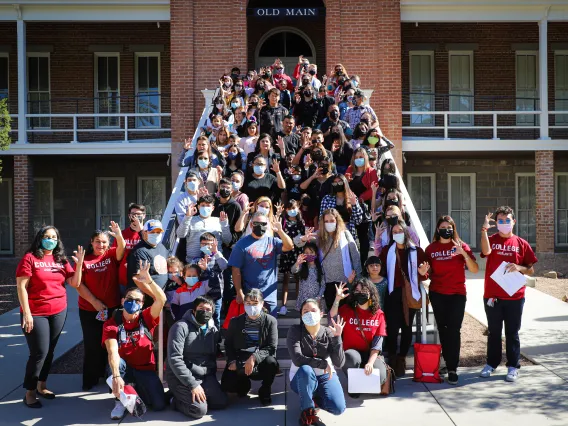The Parent Manual

So does the University of Arizona!
We would like you to know that if you enrolled in the College Academy for Parents (CAP) because you have some questions about what college might offer your family or how your child can become a college student, you are in the right place. You may recognize some of your own thoughts in the reasons previous CAP participants gave for joining the program:
“I’m here to see what college has to offer and know if it’s right for my child.”
“I want to motivate my sons and give them the opportunities I never had in life.”
“I hope to get a better understanding of my and my family’s role in our daughter’s college future.”
“I would like to learn what things colleges look for and how to start preparing to open doors for my child now.”
“I want better knowledge of how to send my children to college without it being such a heavy burden financially.”
“I want to take the fear out of attending a university.”
“I want to know: how can I better myself to help my child?”
“I would like a schedule of when everything must be done so my child can go to college.”
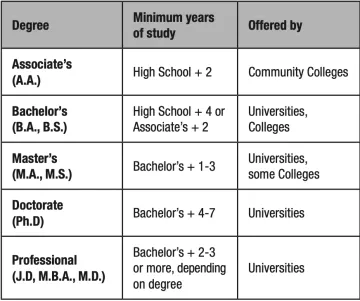
If you’re unsure about all the options right now, don’t worry. As your children mature and their particular dreams and talents unfold, the time will come for them to make these important choices.
What are some colleges you’ve heard of? Using the chart, can you guess which degrees they might offer?
You can find out for sure by using reference guides available at the public library or checking the college’s Web site.
We’ve all heard stories about people like billionaire Bill Gates, founder and CEO of Microsoft, or former Major League Baseball All-Star Fernando Valenzuela. These individuals achieved their success without college degrees. With hard work, talent and a little luck, some people do make it big in this world without going to college. Likewise, a college degree is not an easy path to guaranteed riches: people who hold these degrees also need to work hard and become good at what they do in order to make comfortable lives for themselves. But for most people, holding a college degree greatly improves their standard of living.

What skills learned in college will future workers need? Employers of college graduates look to them for the following abilities, according to the National Association of Colleges and Employers :
- Analytical skills for problem-solving and decision- making
- Communication skills (oral and written)
- Computer skills
- Interpersonal skills for relating to others
- Teamwork skills
In addition, because college challenges students and requires consistent effort on their part, a degree can signal that a student has the following characteristics that employers look for:
- Motivation and initiative
- Strong work ethic
- Flexibilty/ adaptability
Once you understand the expectations, what can you do to motivate young students to go above and beyond those expectations? Two important points to remember are fun and positive reinforcement. Here are some tips for building your student’s confidence and making learning fun for your children:

-
Read to your child or ask older children to read to you. Reading is necessary for exploring every academic subject area.
-
Talk with your child about interesting facts or fun skills he or she is learning in school, and share information about topics that interest you. Remember: be interested and be interesting!
-
Help your child personalize a homework space to make it inviting. Choose a motivational poster for the study area, for example.
-
Recognize your children’s assets and think about how you can help them grow in those areas.
-
Encourage your student to explore talents in music, art, drama, chess or sports. These activities develop young students’ minds and can lead students to participate in extracurricular activities in middle and high school that can make going to school more enjoyable. In addition, colleges and universities ask about these activities in their applications.
Showing your joy over your child’s daily progress will reinforce the natural desire to learn and help your child draw on inner strengths to achieve in every academic subject area
Tip!
Middle and high school students can participate in the Office of Early Academic Outreach’s MESA (Mathematics, Engineering and Science Achievement) program, which includes discounts on special college preparation workshops and UA application fees as well as scholarship opportunities for MESA participants.
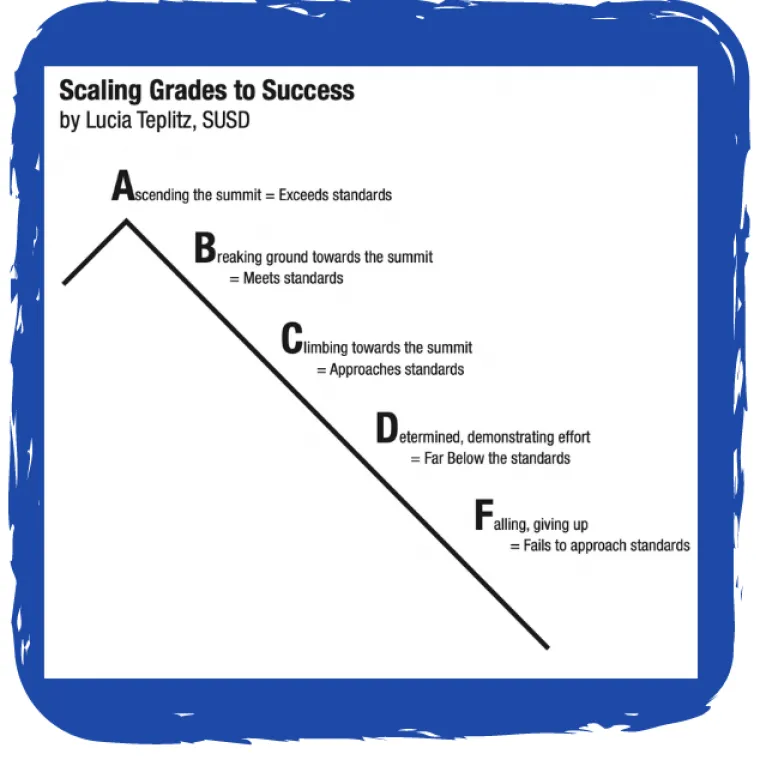
Training your mind is similar to training your body. Practice makes climbing academic mountains easier. Thinking about grades this way makes it clear that students who exceed the minimum expectations early in their school careers will be in good mental shape for the challenging high school coursework required for admission to college.
- Grades are not the only measure of a child’s academic achievement.
- Standardized tests conducted at district, state and national levels assess how well students are learning.
- College-bound students will be expected to exceed minimum standards in their high school coursework.
- An early love of learning and self-confidence in their academic abilities help students face the challenges that stand between them and their goals.
- Parents are in the best position to firmly guide young students toward their academic potential. If your children enjoy learning and see that it pleases you, they will look forward to college as an opportunity to continue that learning.
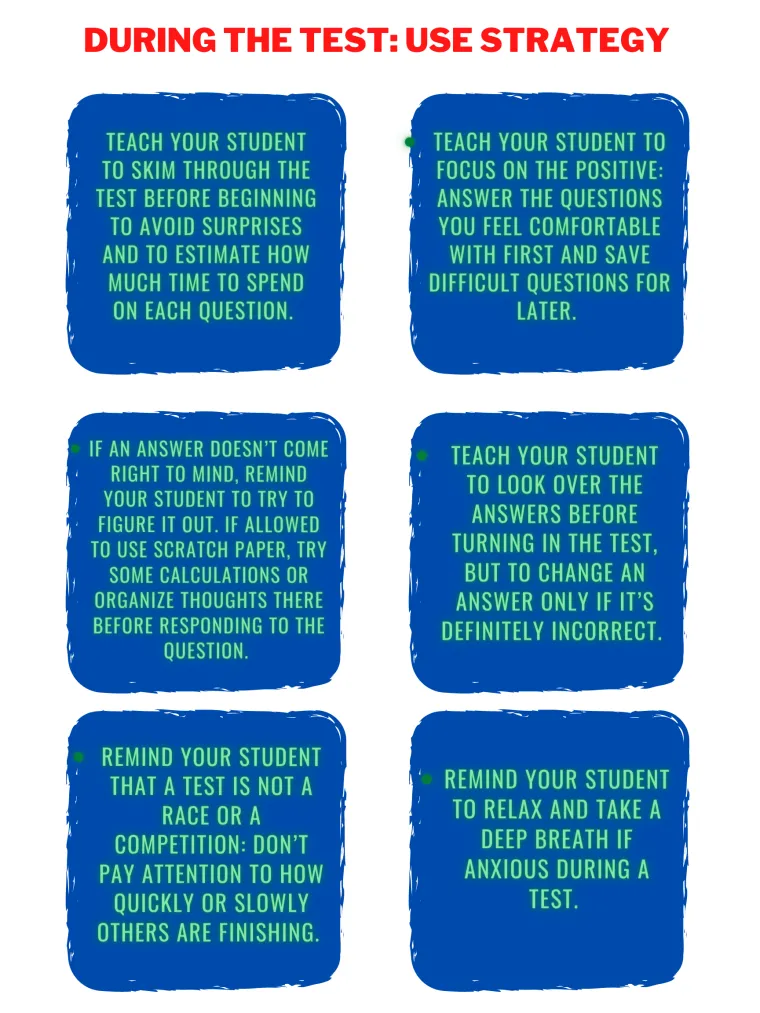
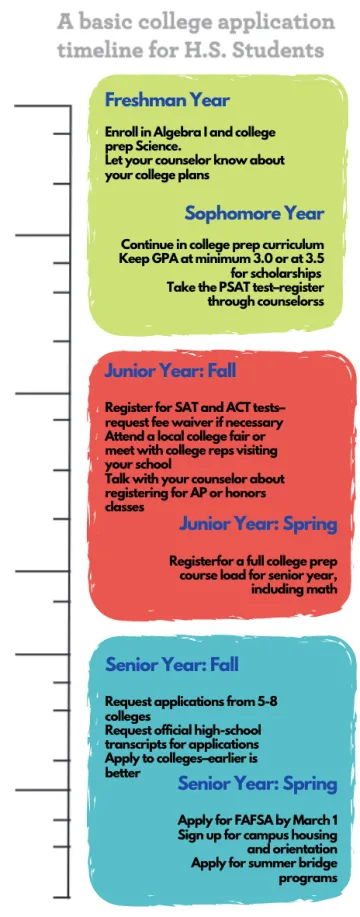
As parents of young students, the best you can do right now to prepare them for college is to encourage their love of learning, reinforce good homework and test preparation habits, make sure to access academic support resources at the schools and celebrate every academic accomplishment along the way to high school.
Once your children reach high school, however, there are very specific steps that they will have to follow in order to be admitted to college and to increase their chances of receiving valuable scholarships to help cover college costs.
Most applications for four-year colleges and universities require at least the supporting documentation listed below to make their admission decision:
- High school transcript showing, courses taken and grades, GPA, class rank.
- SAT and/or ACT scores.
- Colleges often also request personal inventory of extracurricular, leadership, community service and work experience
- A brief essay or a short written response to specific questions
- An interview
- Letters of recommendation from high school personnel
Tip!
Students who are doing well in any of their core subject areas should consult with their high school counselors about taking Advanced Placement (AP) courses; these courses challenge students in ways that may prepare them to be successful in college. Students who earn a minimum score on the AP course exam can receive college credit for their high school work. This can save students money and time in college!
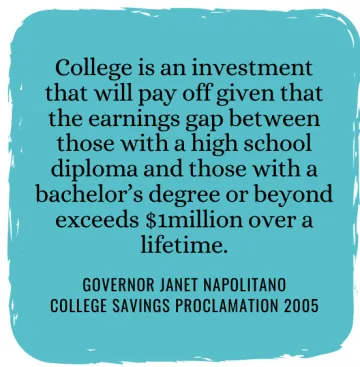
When students reach their senior year of high school, they will be encouraged to apply for this aid by completing the Free Application for Federal Student Aid (FAFSA), which becomes available each October. Families are encouraged to complete the application by the priority deadline of March 1.
There are three types of financial aid that students may qualify for by completing the FAFSA:
- Grants - these monies are provided to those students whose families have the highest level of financial need. Grants do not require repayment.
- Work Study - the federal government may also determine that a student qualifies for the federal Work Study program. Work Study allows students to gain employment with one of the many offices or departments on the university campus.
- Loans - this type of financial aid is the most widely-feared by parents and students. Loans are money that is borrowed in the name of the student, or of the parents, to assist with paying the cost of education. The borrowed money must be repaid with interest. Typically, the federal government offers low interest rates on these educational loans.

